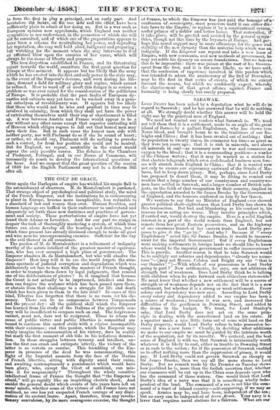THE COUP DE GRACE.
Okcn again the Harlequin of empire has wielded his magic flail to the astonishment of observers. M. de Montalembert is pardoned. That strange object of psychological and political study, the mind of the French Emperor, and the institutions he is endeavouring to plant in Europe, become more inexplicable, less reducible to a standard of law and reason than ever. Human faculties, and human language are balled in their endeavour to understand and adequately set forth these new doctrines and practices of govern- ment and society. These perturbations of empire have not yet found their Adams or Leverrier. And for our part we resign in despair the task of thoroughly mastering a system, of which time future can alone develop all the bearings and destinies' but of which time present has already disclosed enough to make all good and wise men its uncompromising enemies. Sufficient for the day is the evil thereof in all conscience.
The pardon of M. de Montalembert is a refinement of indignity worthy of the astute intellect of the greatest master of equivoca- tion, who has ever occupied a high place of government. The Emperor absolves M. de Montalembert, but who will absolve the Emperor ? How long will it be ere the world forgets the atro- cious spectacle of judicial corruption and degradation which was deliberately set face to face with the masters of French thought, in order to trample them down by legal judgments, that remind one of the deliberations of pirates ? Is it imagined that because the Count is not actually to be imprisoned, intellect and free- dom can forgive the sentence which has been passed upon them, or abstain from that challenge to a struggle for life and death which has been given to them in the late trial ? In cases of this kind, Tiberius has forgotten that there is no room for his cle- mency. There can be no compromise between Torquemada and the present day : all the political skill which the Emperor has learned from his study of the Italians of the sixteenth cen- tiuy will be insufficient to compass such an end. The forgiveness cannot, must not, dare not be -reciprocal. Those to whom the (Anse of public virtue and public liberties is committed are bound to continue this sacred strife with a regime incompatible with their existence ; and this pardon, which the Emperor may vainly imagine the consummation of his victory, does in reality but mark the first moment of ebb tide in his nefarious domina- tion. In these struggles between tyranny and intellect, un- less the first can crush and extirpate utterly, the victory of the latter is as certain as sunrise. This trembling of the Em- peror in presence of the deed he was consummating, this Right of the Imperial assassin from the face of the Marius of French liberties, sitting with dignity amid their ruins, and awaiting contemptuously a punishment which would have been glory, who, except the vilest of mankind, can mis- take it for magnanimity ? Throughout the whole sensitive intellectual frame of France the thought that "the Emperor is afraid," will go rapidly like an inspiriting electric shock. And amidst the general doubt which events of late years have left on mans' minds, whether some of the virtues of old France have not declined, no one has yet suspected French courage of any dimi- nution of its ancient lustre. Apart, therefore, from any revolu- tionary convulsion, by its mere courageous exercise, the thought franbNito 'which the- Emperor ha' jnst1iiiid the • hietntiaetkof confession Of sovereignty, must persevere until it can either 44•31'-; tate laws to the Empire, or replace it by 'a constitutional syStenCe under princes of a nobler and better house. That restoration,' it take place, will be greeted and assisted-by the general syinPILL ' tines, though not this time by the bayonets of Europe. And per.2,, haps this moral support may be more efficacious for the peace azifl stability of the new dynasty than the material help which was AA; indignity. If the Emperor can repent and take .a new lease. of Empire, with new cavenanta, and new methods of government; he may yet settle his dynasty. on secure foundations. But we believe this to be impossible: there was poison at the root of his Govern- ment frota•the .first, and it is far more likely' as we have said, that the confession of impotence involved in this pardon which was intended to adorn the anniversary 'of the 2nd of December, may be the first in that series of events, of which we cannot forecast the means, but which We confidently expect, whereby the chastisement of that great &fence against France nna humanity is being .slowly but surely prepared.


































 Previous page
Previous page